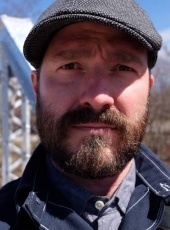On Feb. 6, 2021, Michigan Tech associate professor of creative writing and literature M. Bartley Seigel won the U.P Poet Laureate. The U.P. Poet Laureate promotes the humanities across the U.P., whether that’s from events at schools or publishing local poetry with themes relevant to the local area. He also serves as the director of the Michigan Tech Multiliteracies Center on campus. He’s been a consistent presence in the college writing world, cofounding Pank Magazine in 2006 with Michigan Tech alumni Roxane Gay. Matt also had a collection of poems published called This is What They Say. His poetry has appeared in numerous literary magazines across the state and nation. I was able to get in touch with him over email and ask him about poetry and his work.
When did you realize you loved poetry?
“I started writing poetry in high school and have dabbled with it for most of my life. It wasn’t until after graduate school, however, that I started writing and publishing poetry in earnest. It’s taken most of my adult life to be able to look myself in the mirror, call myself a poet, and not crack a sly grin.”
What drew you to the UP for work?
“My wife, Dr. Marika Seigel, grew up in Houghton. After graduate school, she and I were both eager to return to the Keweenaw and we snatched up positions in the Humanities Department as soon as we could.”
Do you have a favorite spot that inspires your work?
“We have a camp off the No. 4 road north of Eagle River, right on Lake Superior. I like to go there to sauna and write and do so as much as I’m able.”
What’s your favorite poem that you’ve written (or a few)?
That’s like asking a parent to pick their favorite kid! Two of my favorites are “Beach Glass” and “Birch Oil, Smoke, Pine Tar, Switch.” … Both are good U.P. poems, in different ways.
How do you go about writing poetry?
“I usually start with an emotional response to something in my life—I have some feels and I bang out an autobiographical free verse poem. Then I usually try to squeeze that free verse draft into a more formal verse — I’m particularly fond of blank verse — see how I can make the language contort, what I can begin to make the language do that it wasn’t predisposed to do on its own. Then it’s revision, revision, revision, and my poems tend to take on a life of my own from there, take me to places I never intended to go in the first place, which is where the magic usually happens.”
Who is a writer/poet that’s inspired you?
“I’m really a dirty slut of a reader—can I say that? I’m such a lifelong, obsessive, compulsive consumer of storytelling, and I read widely across genres. I love comic books. I love Russian novels. I love popular cosmology. I love an Instagram page called @depressingfridgepoems. I love literary magazines and experimental and emerging writing. The poets who have meant a lot to me range from Walt Whitman to Harriett Mullen to Wallace Stevens to Gertrude Stein. I’m just a really promiscuous reader.”
How can poetry change the world for the better?
“…In a nutshell, language matters, the words we choose to use matter. Our words can lift us up. Our words can bring us low. You need look no further than recent events on our own campus where at least two professors have put language to really irresponsible, hateful, and destructive use, and in ways that clearly neither of them are able to grasp despite their advanced degrees, academic positions, and self-righteous chest thumping. But we’ve seen others in our community use language to affirm and lift up, to push back against ignorance, avarice, and spite, to repair and built—that’s where the poetry is at. Language can burn things down, no doubt—history is chockablock with examples. But at its best, where language becomes poetry, we speak truth to power, and inspires each other to rise up against the demons among us to create new and better ways of being and knowing.”
What is your advice for any aspiring writers and poets?
“Read everything you can get your hands on. Read outside your box. Read where you’re ignorant. Read where it scares you. Read writers that don’t look like you, think like you, believe like you, speak the same language as you. Read about things you have no interest in until the subject becomes interesting. Read to know what you don’t know. Read to know what you don’t know you don’t know. If the Jeff Burls of the world read half as much as they run their ignorant mouths (and pens), we would live in a very different world, indeed. After that, the writing, the good stuff, it just follows as a matter of course.”
Last year, Matt founded a new poetry magazine called Simple Machines. While the magazine isn’t currently accepting new entries, it’ll soon open up for new submissions after its first issue is published.


